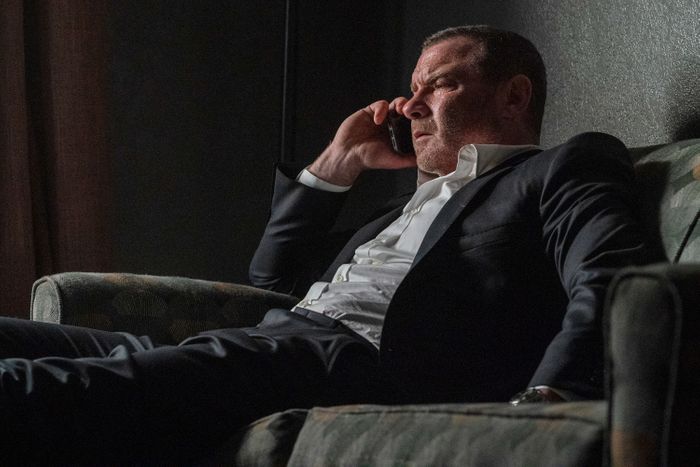
When Showtime unexpectedly canceled Ray Donovan after its explosive seventh season concluded in January 2020, fans were confused and upset. Not only did the abrupt ending come out of nowhere, but the last episode left a number of characters in the wind, feeling in no way like a final word on the saga of Ray and his fractured family. The creative team was planning an eighth season when it got the news, and showrunner David Hollander told Vulture, “There was no sense that this was going to be a completion.”
Luckily for both Hollander and the very loyal fans of the Emmy-nominated show, that completion comes tonight on Showtime in the satisfying Ray Donovan: The Movie, which weaves the early days of Ray and Mickey Donovan into the end of their violent saga. Co-written by Hollander and star Liev Schreiber, Ray Donovan: The Movie never feels like cheap fan service; it hints at what an entire eighth season could have been and provides just enough closure while avoiding easy conclusions for most of its characters. It’s visually ambitious in ways the show was increasingly allowed to be in later seasons, evincing a true cinematic language in terms of craft. But what will really matter to fans is the show has been allowed to end on its own terms. It’s the final job Ray deserves.
The seventh season of Ray Donovan ended with the sudden death of Smitty (Graham Rogers), the husband of Bridget Donovan (Kerris Dorsey), during a deal gone horribly wrong that was orchestrated by the always horribly wrong Mickey Donovan (Jon Voight), the father Ray Donovan (Schreiber) has disavowed multiple times. The action of the film picks up as the senior Donovan flees to Boston with Declan Sullivan’s stocks and the blood of his grandson-in-law on his hands. Naturally, Ray gives chase, although the film sets up a structure in which a defeated Ray is seen early on speaking to his therapist (Alan Alda) about what’s going to happen: “I killed my father.” Clearly, Ray has some scores to settle when he finds his dad, turning the film into a mystery about how that line will play out. Will Ray finally give Mickey the punishment he has deserved for years? Naturally, it’s a little more complicated than that.
As Ray heads to Boston, Hollander and Schreiber continue the flashback structure that made the seventh season so compelling, filling in more of the background of young Ray (Chris Gray) and Mickey (the phenomenal Bill Heck). The father-and-son arc throughout the series is given added depth as the film fills in some of what is basically the origin story of a cleaner: A feature film comes to shoot in Boston, turning Mickey into a local star and teaching young Ray some of the skills of the profession that would define him over the series’ first few seasons.
The most captivating material in Ray Donovan: The Movie comes in these flashbacks, which are rich in terms of writing, acting, and craft. (Heck in particular nails the dangerously casual charm of a young Mickey in a way that recalls a similar danger found in Voight’s early performances, if more in energy than impression.) Holland and Schreiber clearly have a wealth of ideas regarding how Ray and Mickey got this way, and the movie’s masterstroke is how it connects Ray and Mickey’s final act to a formative early one. Ray’s been cleaning up for his father for a long time, and in many ways, Ray Donovan: The Movie is about the day he chooses to stop doing that cleaning.
While Ray Donovan: The Movie smartly focuses on the Mickey-and-Ray dynamic, the writers make time for a few other favorite characters, giving most of the key players story lines that are more ellipses than periods. It would have felt wrong for a show that was often willing to deal in gray areas to neatly tie up the lives of every character on Ray Donovan as weak series finales tend to do; perhaps some of the supporting players would have had more finality in an entire season, but Hollander and Schreiber give the Donovan family just enough narrative to make for a satisfying conclusion.
Most of that family interplay comes early in the film as Terry (Eddie Marsan), Bunchy (Dash Mihok), and Daryll (Pooch Hall) gather after Smitty’s funeral, which of course turns into a drunken, rowdy affair. The family dynamics of Ray Donovan developed over the years as Ray’s brothers became more than just other messes for the cleaner to handle and as the actors leaned into the way connections can be forged through shared trauma. Whether it was Terry’s almost fatherly dynamic with his niece or the way Bunchy allowed his demons to derail his happiness, the dimensionality of the supporting cast really elevated a show that felt dominated in its first few seasons by flashier plotlines and the powerhouse charisma of Schreiber and Voight.
There are a few narrative elements of Ray Donovan: The Movie that feel rushed, especially in how relatively quickly these complex characters get from the end of season seven to their final minutes. (The film could have left Kerry Condon and Josh Hamilton behind as their return here feels like a distracting footnote.) But that’s offset somewhat by performers like Marsan and Mihok being given nice send-offs that allow fans to imagine what these Donovan boys might do after the story ends without feeling like they were cut off mid-sentence, as they would have been without this semi-renewal by Showtime.
Bridget says at one point about her grandfather, “He taught you how to forget,” which feels essential to the repressed trauma that has defined Ray Donovan. Abuse, whether by the church or a parent, can lead to denial and even numbness in its victims when it comes to the value of life. For years, Ray has looked at violent situations and seen only the problems that need to be solved instead of the broken humanity that would stop most people in their tracks. He often misses the human cost because he’s had to pay so much himself, failed by shallow masculinity and institutions that should protect children like church and family. Ray Donovan got notably better in its final seasons when it allowed its title character to really dig into these ideas, and that unpacking continues, and in many ways concludes, in the film.
Will this be the final word on Ray Donovan? Probably. Given the constant diet of nostalgia evidenced by things like the unexpected return of Dexter, no one can ever be absolutely certain, but this feels like a true ending for Ray Donovan, a man who always cleaned up the messes left by other people until he had to face the one his father created inside himself. It will never be fully clear why Showtime denied Ray Donovan a proper farewell season, but nothing’s ever been easy for Ray. Why should his final job be any different?


